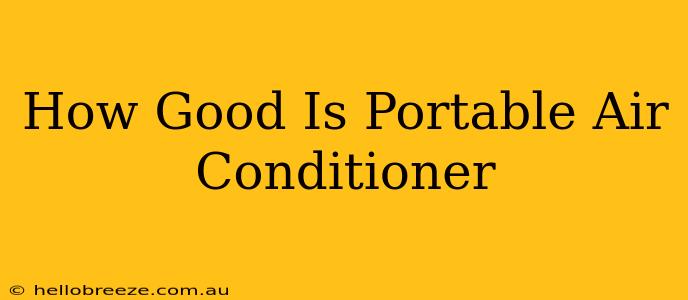Summer's heat can be relentless, making a cool, comfortable home a necessity. Portable air conditioners offer a tempting solution, promising relief without the hassle (and cost) of window units or central AC installation. But how good are they really? This comprehensive guide delves into the pros and cons, helping you decide if a portable AC is the right choice for you.
The Advantages of Portable Air Conditioners
Portable AC units boast several compelling benefits:
-
Flexibility and Convenience: Unlike window units, portable ACs can be moved from room to room as needed. This adaptability is perfect for those who rent, have multiple spaces to cool, or simply prefer the flexibility to adjust their cooling needs.
-
No Installation Required: Forget complicated installations and potential damage to walls or windows. Simply plug it in and go! This ease of use is a major selling point.
-
Cost-Effective (Initially): The upfront cost of a portable air conditioner is generally lower than installing central AC or even a ductless mini-split system.
-
Improved Air Quality: Many portable AC units come with features like air filters that can help improve the air quality in your home, removing dust, pollen, and other allergens.
The Drawbacks of Portable Air Conditioners
While convenient, portable ACs aren't without their shortcomings:
-
Less Efficient Than Other Options: Compared to central AC or even window units, portable ACs tend to be less energy-efficient. This translates to higher electricity bills.
-
Noise Levels: The compressor and fan can be relatively noisy, which can be disruptive, especially at night.
-
Space Requirements: They occupy floor space and require a nearby window or door for the exhaust hose.
-
Exhaust Hose: The exhaust hose is essential for venting hot air, but it can be a nuisance, requiring a suitable window or door opening. Poorly sealed exhausts can also reduce efficiency.
Factors to Consider When Choosing a Portable Air Conditioner
Several factors will influence how effective a portable AC is in your space:
-
Room Size: Ensure the BTU (British Thermal Unit) rating of the unit is appropriate for the size of the room you intend to cool. Underpowered units will struggle to cool effectively, while overpowered units are wasteful.
-
Energy Efficiency: Look for units with a high Energy Efficiency Ratio (EER) to minimize energy consumption and operating costs.
-
Noise Level: Check reviews and specifications for noise level information (measured in decibels). Quieter units are more suitable for bedrooms.
-
Features: Consider features like adjustable temperature settings, timers, and air filters to enhance convenience and comfort.
Alternatives to Portable Air Conditioners
If the drawbacks of portable ACs outweigh the advantages for you, consider these alternatives:
-
Window Air Conditioners: These are generally more efficient and less noisy than portable units.
-
Central Air Conditioning: The most effective solution for whole-home cooling, although it is also the most expensive.
-
Ductless Mini-Split Systems: These offer the efficiency of central AC without the extensive ductwork.
Conclusion: Is a Portable Air Conditioner Right For You?
A portable air conditioner can be a great solution for short-term cooling needs, smaller spaces, or those who value convenience over ultimate efficiency. However, carefully weigh the pros and cons, and consider the factors listed above before making a purchase. If you need long-term, whole-home cooling, or prioritize energy efficiency and quiet operation, other options might be a better fit. Ultimately, the "goodness" of a portable air conditioner is subjective and depends heavily on your individual needs and circumstances.

